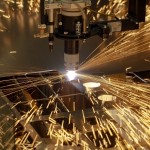Friday, September 03, 2021
 The versatility of precision machining allows for the creation of
molds and machine parts accurately and effectively down to the tiniest of details. Some of the most commonly created molds for the manufacturing
industry include compression and injection. Its important that a mold is designed correctly so production is precise and time-efficient. Choosing
the right kind of mold to use can help increase profit and decrease waste.
The versatility of precision machining allows for the creation of
molds and machine parts accurately and effectively down to the tiniest of details. Some of the most commonly created molds for the manufacturing
industry include compression and injection. Its important that a mold is designed correctly so production is precise and time-efficient. Choosing
the right kind of mold to use can help increase profit and decrease waste.
Compression molds use heat and compression to shape a raw material. For example, thermoset plastics are heated until pliable and closed into the mold for a certain period of time. When the material has cooled, the mold is opened and the plastic has been set to the determined shape. This type of mold is cost-effective, as it is one of the cheapest ways to mass-produce products out of a variety of materials. It also wastes very little material or energy. The most common products created through compression molds include car parts and household appliances.
An injection mold is used to create plastic products like toys, water bottles and cell phone cases. A liquid form of plastic is forced into the mold, which is then tightly clamped together. Injection molding allows complex shapes to be created and it is also a low-cost process with a very small impact on the environment. In fact, any plastic left over from this process can be re-used to make something else in the future.
Prototypes and fasteners are also among the most frequently created products for manufacturers. Prototypes created with precision machining can test a concept or idea that could make manufacturing of a specific product better. Through trial and error the prototype can be evaluated, improved and then approved. It will then be mass-produced by the machining company and purchased by the manufacturer or long-term usage. Examples of prototypes can include anything from a mold to a fastener.
Speaking of fasteners - produced through precision machinery, fasteners of all materials, safely secure molds and machines. Designed and created to fit specifications and requirements, fasteners are crucial to the proper functioning of a piece of equipment. Fasteners for example keep two pieces of a mold together so the material can be formed and hardened. Without them, accuracy, strength and durability are compromised.
Since technology and the precision machining industry have came so far, products and molds can be created to the highest standards for large to small projects. Quality of these products can make all the difference when looking for effective and efficient molds, prototypes or fasteners.
TAGGED AS:
- machining
- machining design
- machining materials
